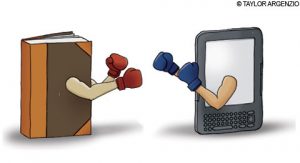Modern advances in technology such as e-readers and tablets have been used as alternatives to the traditional paper type. Books, magazines, and the daily news are all digital now. Because of digital methods, reading and doing research are indeed more convenient. Being someone who reads with a Kindle and paperbacks, I know firsthand that reading in a dark room with a lit screen may be convenient. However, it can be a struggle to focus and grasp everything you’re reading. Scientists have noticed that reading and doing research digitally could be harmful to the way we think, receive, and process information. Although the internet is a central source of knowledge and information, it is hindering our ability to critically read and do effective research.
Some digital methods of doing things are completely beneficial, such as writing or drawing because you already have a “focus” or “idea.” On the other hand, with reading and doing academic research it can be distracting. Even though the internet gives easy access to a wealth of information, the overload can divert your attention. In an article, The Reading Brain in the Digital Age: The Science of Paper versus Screens, written by journalist Ferris Jabr, research shows that not only can reading on a screen cause you to be distracted, but also how it can be more arduous on your eyes and brain. Prolonged digital use (computers, phones,etc) puts strain on the eyes and in my case, causes my eyes to want to wander. Use of E-readers and technologies with even LCD screens can lead to problems, ranging from blurry vision to computer vision syndrome. (Reading paper screens. Jabr.) Additionally, articles read on the Internet may not be fully comprehensible due to ads, pop ups, difficult texts, and other distractions. Online reading may drastically affect a readers ability to think. Journalist Nicholas Carr acknowledges this, “And what the Net seems to be doing is chipping away my capacity for concentration and contemplation. My mind now expects to take in information the way the Net distributes it: in a swiftly moving stream of particles. Once I was a scuba diver in the sea of words. Now I zip along the surface like a guy on a Jet Ski.”(Is Google Making us Stupid? Carr). Carr is saying that although we are reading, we are not completely absorbing the information in the way we should. We unintentionally skim and read words without completely comprehending them since we are used to having the ease and practicality of the Internet.
Even though there are evident challenges with digital reading, people believe living in this digital age means that the what is viewed as plagiarism should be updated. In an article written by Susanne Murphy, she states that schools are losing their ability to have an influence in the outside world because there are many sources online and that plagiarism is an ideology that does not matter in modern day society. (Plagiarism Is Dead..Murphy). Though she is correct about the internet being a powerhouse for information, I disagree with her claim that schools are losing their ability to matter. In my opinion, schools should offer students a choice to do things either traditionally or digitally. This way they have a balance and can eventually decide which is more personally intelligible as a learning technique. In Paula La Farge’s article, she explores the challenges of digital technology and its effect on the reading brain, while giving insight on how to effectively change the way you read digitally in order to have more success. “The Internet’s flood of information, together with the distractions of social media, threaten to overwhelm the interior space of reading, stranding us in what the journalist Nicholas Carr has called “the shallows,” a frenzied flitting from one fact to the next.” (Qtd. by Paula La Farge). The Internet is indeed a flood of information that can easily overwhelm, but perhaps if used properly it can be an academically valid resource.
Personally, I have been introduced to new methods when it comes to doing academic work digitally. I have found that annotating and writing your understanding of each paragraph will gradually help form your perspective. I used to read hardcover and paperback books as most kids did growing up and because my father was a teacher he encouraged reading. This had an immense impact on me and reading became my favorite pastime. One year, I received a Kindle for Christmas and I instantly got hooked, not only did it have books, but it had the Internet. This was around the age when Facebook was something I used all the time. Not only were there many distractions, but also the simple fact that it didn’t feel nor look like a book. “People expect books to look, feel and even smell a certain way; when they do not, reading sometimes becomes less enjoyable or even unpleasant.” (Reading Paper Screens Jabr.) This was mostly likely the case for me. For example, the artistic cover was now just a digital image that would be swiped and forgotten. The cover, to me, is a part of the experience; a portal that gives a visual peek of the books world.

The traditional way of using paper and pencil will have is faults, but it is more useful and reliable especially when it comes to academic assimilation. Schools should let students choose which way they prefer and work better with on a personal level. Requiring students to use a specific style adds more limitations. Schools should offer programs which teach how to use the internet properly for academic research. The Internet is still young and until we learn to use it to its full potential, we must stick to what we know best, paper and pencil.